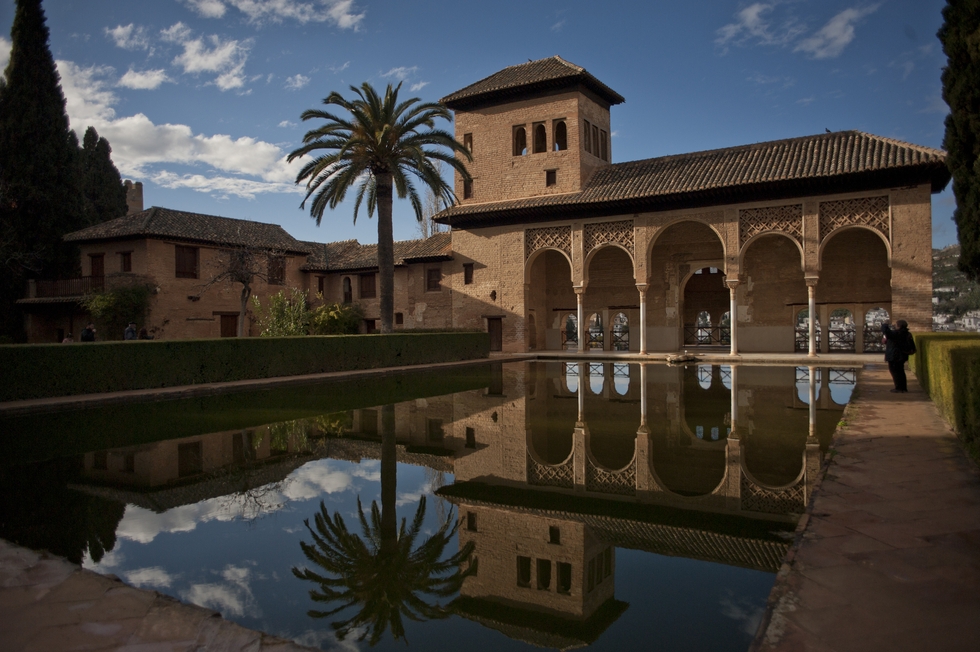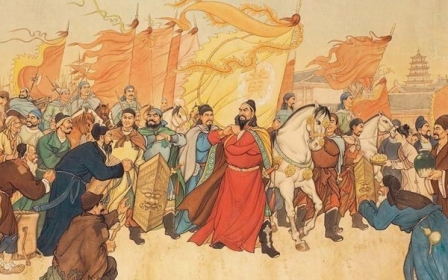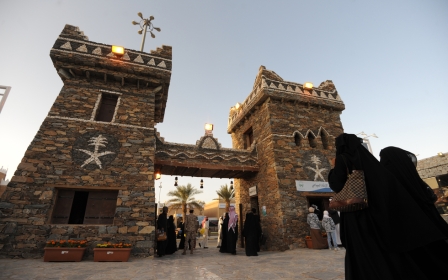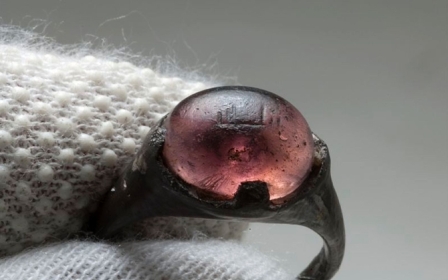Erasing Arabs from Arab history

Watching a documentary on Andalusia under Arab rule recently I was struck by something peculiar. All the calligraphy on the wall was in Arabic, all the books mentioned were written in Arabic, all the notable leaders who spearheaded the construction of the Islamic kingdoms in the Iberian Peninsula were Arabs with established connections to their Arabian roots, yet not once was the word "Arab" mentioned.
The Arabic script carved in the woodwork of the Mezquita or pictures of ancient Arabic books of medicine or astronomy were unmissable yet the narrator refused to connect this Arabness to the very people behind Andalusia: the Arabs.
In Morocco the discourse from the voiceover was the same: the palaces and forts and the mosques and souks were all reminiscent of Damascus or Sanaa but somehow the word "Arab" was absent from the narrator's script.
It's as if the word "Arab" had suddenly become rude, unacceptable and shameful. Like the once derogatory words now perceived as racist and shunned, Arab, Arabs and Arabness have acquired an almost similar connotation and everything is done to empty even history books of this people's vast accomplishments.
The trend has been going on for some time and while a perniciously racist Eurocentric vision of the Arab world has no doubt contributed to this change of discourse, the rejection of all things Arabic is now deeply seated in the wider Muslim world and in Arab nations as well.
Berber claims in Andalusia
Andalucia, once a by-word for Arab achievements, has become over the years whitewashed of its Arab history. Pointing to some Berbers involved in the initial conquest of Spain, the entire enterprise has been conveniently re-labelled a Berber conquest, with claims that the architecture and literature - written in Arabic - is Berber.
Never mind that the Berbers had to wait for the arrival of the Arabs to enter Spain, that they didn't use their language once they did and that prior to the Islamic conquest no construction across North Africa is reminiscent of what Arabs built elsewhere across the region, commentators pointing to Andalucia have taken to calling it a Berber conquest.
There is no doubt Berbers were part of the invading troops enlisted by conquering Arabs travelling from North African shores but there is little doubt as well that indigenous Berbers were also involved in the construction of the various Roman cities darted across the Maghreb in modern day Algeria, Tunisia or Libya. Does anyone refer to these Roman constructions - now ruins - as Berber in the same way Arab architecture is now described as Berber or at best Arab-Berber?
During the first Punic Wars that pre-dated Arab arrival in North Africa, Hannibal Barca gained the support of Numidian Berber leader Massinissa to fight the Romans.
The Carthage empire was already present in the very southern flank of the Iberian peninsula. The Numidian leader defected to the Romans on the battlefields of Zama and could have gone to Spain with his now Roman allies to forge his empire, instead this lacklustre leader returned to North Africa to govern over his limited patch.
When the Arabs arrived they brought their religion, language, culture and engineering knowhow and created one of the most successful Arab outposts of the Mediterranean basin. Andalucia is an Arab achievement yet today the word Arab is almost absent from historical narratives.
Words such as Moors, Berbers or Muslims are used instead.
Berber historians today insist that they were instrumental in the invasion of Spain and point to one Tariq Ibn Zayed, a Berber and zealous Muslim convert who led a fleet to the Iberian peninsula as proof. Once again individual cases of non-Arab involvement exist but the overall story is one of Arab conquest.
When referring to the vast body of scientific work conducted and compiled in Arabic, many new historians claim that all were written by Berber converts to Islam who adopted the language of the Islamic conquerors out of religious fervour, despite boasting an equally inspiring civilisation that rivalled its Arab counterpart. Again there have been notable Berber scientists who shone in the midst of their Arab co-religionists but the context in which these scientific achievements were realised were undoubtedly Arab.
Historical revisionism
This historical revisionism however does not hold up to scrutiny. If Berbers were as sophisticated as new historians claim, why adopt the Arabic language? The Persians and later the Ottomans were profoundly Muslim and while again they adopted Arab script after their conversion to Islam they nevertheless retained their Persian and Turkic tongue.
The aim here is not to favour a civilisational contest. Berbers boast an ancient yet oral tradition that survived and thrived for centuries before the Islamic conquest. Unfortunately, Eurocentric historians keen to adopt Western models of history-telling and data-compiling have all but invented dates, events and eras for which there is no solid historical base. Oral traditions point to some realities which directly contradict what new historians, with clear anti-Arab bias, have written and which is visible from their methodological approach.
One notable example is the festival Ennayer (or Yennayer) celebrated as Berber new year in Algeria since 2001. Barely known in the Berber strongholds of the country before the turn of the millennium, this celebration is in fact Persian Nowruz, brought into the country through Kurdish soldiers fighting in the Ottoman army.
The parallel between the rituals of the Persian festivity and the Algerian celebration popular in particular in the former military towns of western Algeria is testament to that. Furthermore the celebration is unknown in Morocco despite its considerable Berber population.
In a twist of almost comical proportions the recently created Berber calendars had at one point a 2000 year discrepancy between the Berber new year in Morocco and that of Berbers in Algeria separated only by a French-made border in the 19th century.
All this points to the desire to fabricate a history in a bid to ignore or simply whitewash the Arab presence which has, as previously stated, acquired an almost derogatory meaning.
In a recent video circulated on social media designed to convey a message of unity among peoples, two young girls - one Spanish, the other Arabic - discuss the similarities between their languages and are astonished to discover that almost 60 percent of Spanish words are in fact Arabic. What this short entertaining clip reveals is that the narrator speaks of the "Moors" having influenced Spanish instead of the role Arabs played in this.
Interestingly all is done to erase the Arabness of even the Arabic language.
Middle East politics
Politics no doubt play a role in this new discourse. The unpopularity of the al-Saud dynasty ruling Saudi Arabia today has had a profound impact.
Arabs are almost exclusively seen through the prism of Saudis who have, due to their rulers' politics, become unpopular among even Arabs and the wider Muslim world.
This has contributed to how many people from across the wider Muslim world equally participate in this whitewashing of history by referring to any Arab achievement as a Muslim success.
The rivalry between Iran and Saudi is again another factor. In a bid to perpetuate insidious racism targeting Arabs, many point to the vastly superior Persian civilisation.
There is no doubt the Persians before Islam and since continue to be a shining civilisation for which the Arab prophet of the Muslims himself expressed great admiration. However no one could or should compare the achievements of a people residing in the variable climate Iran enjoys with that of the people living in the harsh environment of the Arab peninsula.
Cold rainy winters and mild springs means that agriculture and development in many areas was and remains possible in Iran. Compare that to the scorching heat that makes the Arabian Peninsula a barren land in which very little grows and there lies the difference between the two.
As soon as the Arabs travelled beyond the region thanks to the Islamic conquest, the captured cities became testament to their skills and know-how.
An Islamic success through atheist eyes
Over 1400 years ago the prophet of Islam, Muhammad, delivered a message to his people that led them to travel out of Arabia and create an empire. The Arab world as it stands today stretches from the Atlantic to the Persian Gulf where 300 million people are bound by language, culture and religion all because of one Arab man.
For a Muslim that miracle is divine; for the non-Muslim however this achievement makes the Prophet Muhammad one of the greatest men in history who changed the face of his wider region and the globe.
In recent years recognising the importance of the Arabs and their role in the history of the modern world has been gradually erased from everyday discourse. There is an apparent desire to downplay both the importance and the level of expertise displayed by Arabs throughout the ages. Ongoing political turmoil in the Arab world plays a significant factor in this change of tone towards a people once seen as successful and enlightened.
While there is little to rejoice in looking at the region today, Arab history is nevertheless one of greatness like many others. A region that was once the epicentre of science, learning and religious diversity is 1437 years old. What other cultures can claim to have done so much barely into their 15th century? It's adolescence is proving arduous but its future in light of its infancy is promising, providing of course its history is never forgotten.
- Hafsa Kara-Mustapha is a journalist, political analyst and commentator with a special focus on the Middle East and Africa. She has worked for the FT group and Reuters and her work has been published in the Middle East magazine, Jane's Foreign report and a host of international publications. A regular pundit on TV and radio, Hafsa can regularly be seen on RT and Press TV.
The views expressed in this article belong to the author and do not necessarily reflect the editorial policy of Middle East Eye.
Photo: Tourists visit the Alhambra in Granada, the most visited monument in Spain, on 19 March, 2016 (AFP).
This article is available in French on Middle East Eye French edition.
New MEE newsletter: Jerusalem Dispatch
Sign up to get the latest insights and analysis on Israel-Palestine, alongside Turkey Unpacked and other MEE newsletters
Middle East Eye delivers independent and unrivalled coverage and analysis of the Middle East, North Africa and beyond. To learn more about republishing this content and the associated fees, please fill out this form. More about MEE can be found here.





